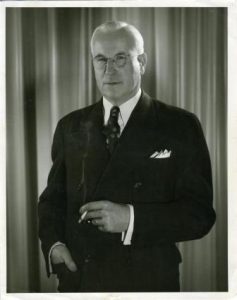 A.B. MacDonald, a native of Heatherton, Antigonish County, was a member of a large, successful farming family. He enrolled at St.F.X., intending to pursue a career in medicine or dentistry, but instead fell under the influence of Father Jimmy Tompkins who introduced him to “Little Doc Hugh” MacPherson and encouraged him toward a career in scientific agriculture. He received his B.A. degree in 1915.
A.B. MacDonald, a native of Heatherton, Antigonish County, was a member of a large, successful farming family. He enrolled at St.F.X., intending to pursue a career in medicine or dentistry, but instead fell under the influence of Father Jimmy Tompkins who introduced him to “Little Doc Hugh” MacPherson and encouraged him toward a career in scientific agriculture. He received his B.A. degree in 1915.
Initially, he worked with farmers as a Nova Scotia Department of Agriculture fieldworker, but later became Inspector of Schools for Antigonish-Guysborough. Throughout the 1920s, “A.B.,” as he was known, worked with the St.F.X. Alumni Association and the Scottish Catholic Society of Canada; both included a network of idea-men from other organizations seeking solutions to the economic malaise of the region. In 1925, he and R.J. MacSween, Nova Scotia agricultural representative for Cape Breton County, were among the first laymen invited to participate in the Rural Conference at St.F.X.
Rev. Dr. Moses Coady invited A.B. to be his Associate Director of Extension in 1929, and the two began a fruitful 14-year collaboration. He and Coady, with the help of their staff, created and implemented a new adult education program. Coady described MacDonald as a brilliant man, capable of organizing and maintaining a far-flung network of study clubs and cooperatives, who had a “keen and penetrating mind, always ahead of the people yet practical enough to keep within the range of what was possible. He was radical enough in other words to be progressive, and, conservative enough to be sane.”
A.B. MacDonald became a larger-than-life figure. An engaging public speaker, he was tall, handsome and always impeccably dressed, even at the end of a four-meeting day. While he had the appearance of a corporate executive, he also had a common touch. At ease in front of the roughest crowd, his vision of economic democracy convinced people that everyone could succeed. The expense of raising a growing family prompted him to accept the position of National Secretary with the Co-operative Union of Canada in 1944. Always seeking ways to find capital and grow the co-operative sector, MacDonald helped to create co-operative life insurance companies and led the struggle to establish a national fire and casualty company during the 1940s. He also introduced C.A.R.E. to Canada and for two years was national chairman of the United Nations International Children’s Emergency Fund. He received a honourary degree from his alma mater 12 hours before his death in Ottawa.
At A.B. MacDonald’s funeral there was no eulogy, no spoken word other than the liturgy of the Mass and the ceremony at his graveside. However, the hundreds that assembled there spoke volumes for the stature and influence of the newly-deceased. The throng was rich in dignitaries but swelled by the ‘little people’ to whom A.B. MacDonald had dedicated his life.
